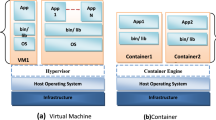Abstract
Volunteer Computing is an exciting discipline for high throughput applications but due to inherent resource volatility, several issues arises such as tasks failure due to host / CPU unavailability, results validation etc. Replication is a solution to most of these problems but excessive replication can cause wastage of precious processing cycles. In this paper, we have extended our work of group based scheduling mechanism by proposing three replication policies i.e. proactive, reactive and hybrid used for Silver, Platinum and Gold groups respectively. The measures used for making the volunteer grouping are: collective impact of CPU & RAM, spot checking and task completion history. We evaluated the proposed mechanism over a network of 900 nodes having varied resources and behavior. The results are promising and show that the wastage of processing cycles can greatly be reduced by applying the suitable replication policies for each group.






Similar content being viewed by others
References
The compute against cancer project, http://www.computeagainstcancer.org/.
FIGHTAIDS ‘The fight aids at hoe project’ http://www.fightaidsathome.org/.
GIMPS, ‘The Great Internet Mersene Prime Search(GIMPS), ’http://www.mersenne.org/.
SETI@Home, ‘The SETI@Home Project’, http://setiathome.ssl.berkeley.edu/.
Kondo, D., Chien, A., & Casanova, H. (2007). Scheduling task parallel applications for rapid turnaround on enterprise desktop grids. Journal of Grid Computing, 5(4), 379–405.
KanWatanabe, M. H., & Horiguchi, S. (2007). Optimal spot-checking for computation time minimization in volunteer computing. Journal of Grid Computing, 7(4), 575–600.
Kondo, D., Taufer, M., Brooks, C., Casanova, H., & Chien, A. (2004). Characterizing and evaluating desktop grids: An empirical study. IEEE international parallel and distributed processing symposium. New Mexico.
Khan, M. K., Hyder, I., Chowdhry, B. S., Shafiq, F., & Ali, H. M. (2012). A novel fault tolerant volunteer selection mechanism for volunteer computing. Sindh University Research Journal—Science Series., 44(3), 138–143.
Kondo, D. (2009). Cost-benefit analysis of cloud computing versus desktop grids. Italy: IEEE international parallel and distributed processing symposium.
Khan, K., Hyder,I., Ahmed, G., Begum, S. (2013). A Group based fault tolerant scheduling mechanism to improve the application turnaround time on desktop grids. International Arab Journal of Information Technology. Accepted in Sep 2013.
Kondo, D., Araujo, F., Malecot, P., Domingues, P., Silva, L., Fedak, G., Cappello, F. (2007). Characterizing result errors in internet desktop grids. 13th International Euro-Par Conference. France.
Gaurav, D., Ghare, Scott, T., Leutenegger. (2004). Improving speedup and response times by replicating parallel programs on a SNOW. 10th Workshop on job scheduling strategies for parallel processing.
Author information
Authors and Affiliations
Corresponding author
Rights and permissions
About this article
Cite this article
Khan, M.K., Hyder, S.I., Ahmed, G.U. et al. A Group Based Replication Mechanism to Reduce the Wastage of Processing Cycles in Volunteer Computing. Wireless Pers Commun 76, 591–601 (2014). https://doi.org/10.1007/s11277-014-1727-x
Published:
Issue Date:
DOI: https://doi.org/10.1007/s11277-014-1727-x




